Haemorrhoids (Piles)
Haemorrhoid medicine targets the uncomfortable symptoms and underlying causes of haemorrhoids, also known as piles. Haemorrhoid medicine includes creams and ointments containing active ingredients to reduce inflammation and pain, suppositories for internal haemorrhoids, and pads to soothe the affected area. Read More…

-
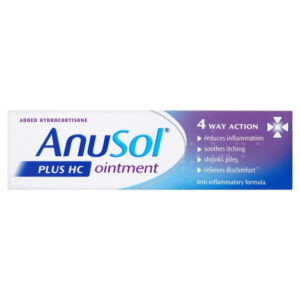
Anusol Plus HC Ointment 15g
- Helps To Relieve Swelling, Itching & Irritation
- Fast Delivery Option Available At Checkout
- Buy With Confidence From UK Registered Pharmacy
£6.39 Select options -
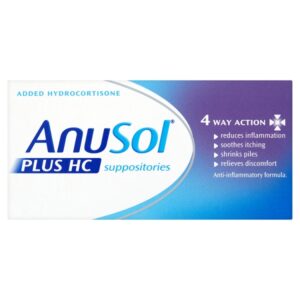
Anusol Plus HC Suppositories – 12 Suppositories
- Free Prescription
- Buy Online With Confidence From UK Registered Pharmacy
- Helps Relieve Haemorrhoids
£6.59 Select options -
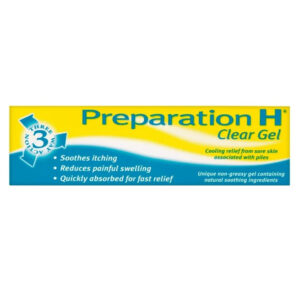
Preparation H Clear Gel
- Cooling Relief From Sore Skin Associated With Piles
- Active Ingredient: Hamamelis Water
- Buy With Confidence From UK Registered Pharmacy
£4.89 – £7.49 Select options -
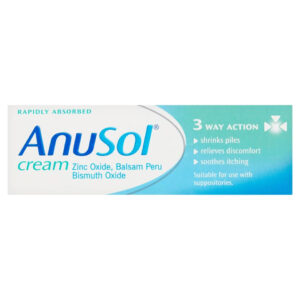
-
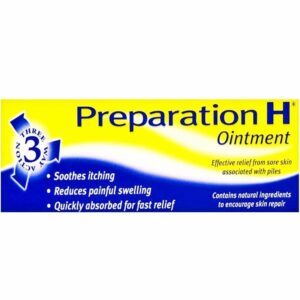
Preparation H Ointment 25g
- Temporarily Shrinks Haemorrhoids
- Easy Application
- Relieves External And Internal Discomfort
£4.79 Add to basket -
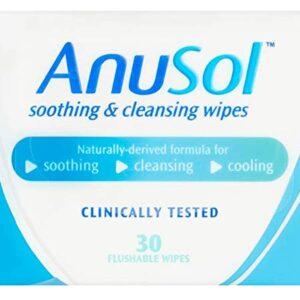
Anusol Soothing And Cleansing Wipes – 30 Wipes
- Fragrance And Alcohol Free
- Suitable During Pregnancy or Breastfeeding
- Dermatologically Tested
£5.59 Add to basket -
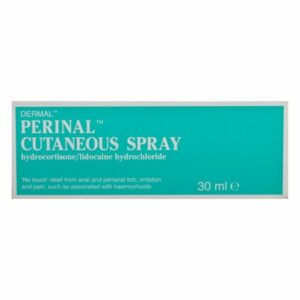
Perinal Cutaneous Spray – 30ml
- Relieves Pain & Itch Caused By Haemorrhoids
- Active Ingredient: Hydrocortisone and Lidocaine
- For Short-Term Use
£13.09 Select options -
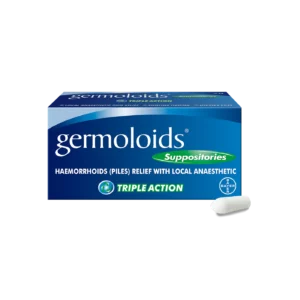
Germoloids Suppositories – 24 Suppositories
- Effective Treatment For Haemorrhoids
- Easy Application
- Relieves Pain Associated With Haemorrhoids
£9.19 Add to basket -
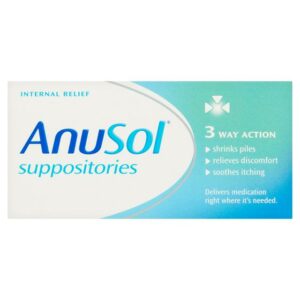
Anusol Suppositories – 12 Suppositories
- Provides Relief From The Discomfort Of Internal Piles
- Easy To Use
- Soothes Itching
£4.79 Add to basket -
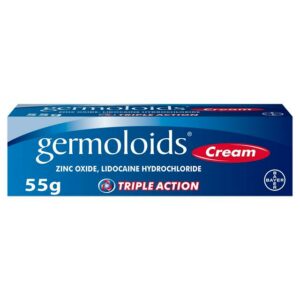
Germoloids Cream 55g
- Effective Treatment For Haemorrhoids
- Easy Application
- Relieves Pain Associated With Haemorrhoids
£9.49 Add to basket -
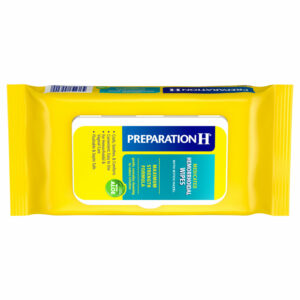
Preparation H Soothing Wipes – 30 Wipes
- Temporarily Shrinks Haemorrhoids
- Easy Application
- Relieves External And Internal Discomfort
£5.19 Read more -
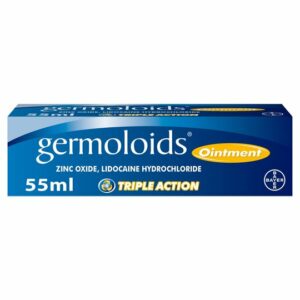
Germoloids Ointment 55ml
- Effective Treatment For Haemorrhoids
- Easy Application
- Relieves Pain Associated With Haemorrhoids
£8.99 Add to basket -
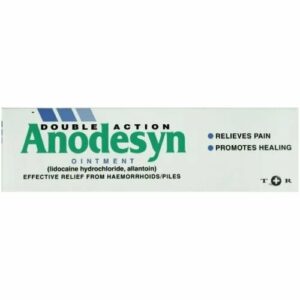
Anodesyn Ointment 25g
- Cooling Relief From Sore Skin Associated With Piles
- Buy With Confidence From UK Registered Pharmacy
- Next Day Delivery Available
£6.09 Read more -
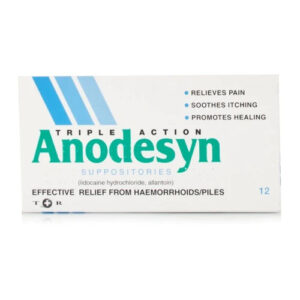
Anodesyn Suppositories – 12 Suppositories
- Effective Treatment For Haemorrhoids
- Easy Application
- Relieves Pain Associated With Haemorrhoids
£6.49 Read more -
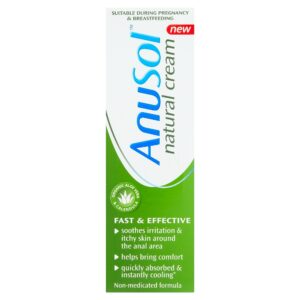
Anusol Natural Cream – 30g
- Soothes irritation and itchy skin around anal area
- Helps bring comfort
- Quickly absorbed and instantly cooling
£7.19 Add to basket
-
About Haemorrhoids
Haemorrhoids are swellings that develop due to the engorgement of veins in the rectal and anal areas. They present with discomfort, bleeding during bowel movements, and potentially pain if thrombosis occurs. Risk factors contributing to their development include chronic constipation, straining, a low-fibre diet, and prolonged sitting. The importance of early management lies in preventing progression and complications. Treatment varies from lifestyle modifications and topical treatments to procedural interventions in severe cases.
-
Symptoms
The symptoms of haemorrhoids (piles) include discomfort, itching, and pain around the anus, especially during bowel movements. Common signs include:
• Itching or irritation in the anal region.
• Pain or discomfort around the anus.
• Swelling around the anus.
• Bleeding, which may be noticeable during or after bowel movements.
• A feeling of fullness or a lump at the anus, which may be painful if thrombosed.These symptoms can vary depending on whether the haemorrhoids are internal or external. Internal haemorrhoids are usually less painful and might not be felt unless they prolapse, whereas external haemorrhoids can be more painful and are typically felt as a lump near the anus. If symptoms persist or if there is significant bleeding or pain, it’s important to consult a healthcare provider to rule out more serious conditions and discuss appropriate treatment options.
-
Diagnosis
Diagnosing haemorrhoids (piles), typically involves several steps to determine the presence and type of haemorrhoids:
• Medical History Assessment: The doctor will start with a thorough review of your symptoms and medical history. Questions may focus on your bowel habits, diet, presence of blood in the stool, and any history of digestive diseases.
• Physical Examination: This includes a visual inspection of the anal region to identify external haemorrhoids. The doctor may look for any signs of swelling, inflammation, or external hemorrhoidal tags.
• Digital Rectal Examination (DRE): During this exam, a doctor wears a glove and lubricates a finger to gently palpate the inside of the rectum. This helps in identifying internal haemorrhoids and assessing any abnormalities in the anal canal’s structure.
• Anoscopy: A small instrument, an anoscope, is inserted into the rectum to provide a clear view of the internal haemorrhoids and the lining of the rectum. This procedure is commonly used if internal haemorrhoids are suspected.
• Additional Diagnostic Tests: If there’s a need to explore further, especially to rule out other causes of bleeding or anaemia, a sigmoidoscopy or colonoscopy might be recommended. These procedures allow the doctor to examine the lower or entire colon respectively, looking for polyps, cancer, or other conditions that could cause similar symptoms.The diagnostic process helps to confirm the presence of haemorrhoids and also aids in planning the appropriate treatment, which could range from lifestyle adjustments and medications to more invasive procedures if necessary.
-
Treatment
Over-the-counter (OTC) medications can offer significant relief from the symptoms of haemorrhoids. These products typically include creams, ointments, suppositories, and gels that can reduce swelling, alleviate pain, and soothe itching. Here are four products that we highlight for their effectiveness in managing haemorrhoids:
Anusol Plus HC Ointment: Aids in relieving swelling, itching, and irritation associated with haemorrhoids.
Anusol Plus HC Suppositories: These are inserted rectally to directly help relieve the discomfort of internal haemorrhoids.
Anusol Cream: Works to shrink hemorrhoidal tissue, relieve discomfort, and soothe itching.
Preparation H Clear Gel: Provides cooling relief for sore skin due to piles, with hamamelis water as the active ingredient known for its soothing properties.Each of these products is designed to target the discomfort caused by both internal and external haemorrhoids, offering patients a range of options depending on their symptoms and preferences. It’s always recommended to use these treatments as directed and consult a healthcare provider if symptoms persist or worsen.
-
Prevention Strategies
Preventing haemorrhoids involves a few practical steps that can reduce the risk of developing this uncomfortable condition. Experts recommend the following strategies:
• Fibre Intake: Increase the consumption of high-fibre foods like fruits, vegetables, and whole grains. A fibre-rich diet can help prevent constipation and straining, which are major contributing factors to haemorrhoids.
• Hydration: Drink plenty of fluids, aiming for 6 to 8 glasses of water per day. Adequate hydration softens the stool, which can prevent straining during bowel movements.
• Timely Bathroom Habits: Respond to the urge to have a bowel movement promptly. Delaying can harden the stools and lead to straining.
• Exercise: Engage in regular exercise to stimulate bowel function and prevent constipation. Exercise also helps in managing weight, which can be a contributing factor to haemorrhoids.
• Avoid Prolonged Sitting: Long periods of sitting, particularly on the toilet, can increase the pressure on the veins in the anal and rectal area, so keep these sessions brief.
• Fibre Supplements: If your diet lacks fibre, consider fibre supplements. They can improve stool bulk and consistency, aiding in smoother bowel movements.
• Avoid Straining: When passing stool, avoid straining, which increases the pressure on the veins in the lower rectum.
• Proper Lifting Techniques: Use proper form and techniques when lifting heavy objects to prevent excessive strain on the body.
• Consultation With a Doctor: If you experience changes in bowel habits or if conservative measures do not alleviate symptoms, consult a healthcare provider for personalised advice and treatment options.By adopting these measures, many individuals can prevent the onset of haemorrhoids or manage their symptoms more effectively.












